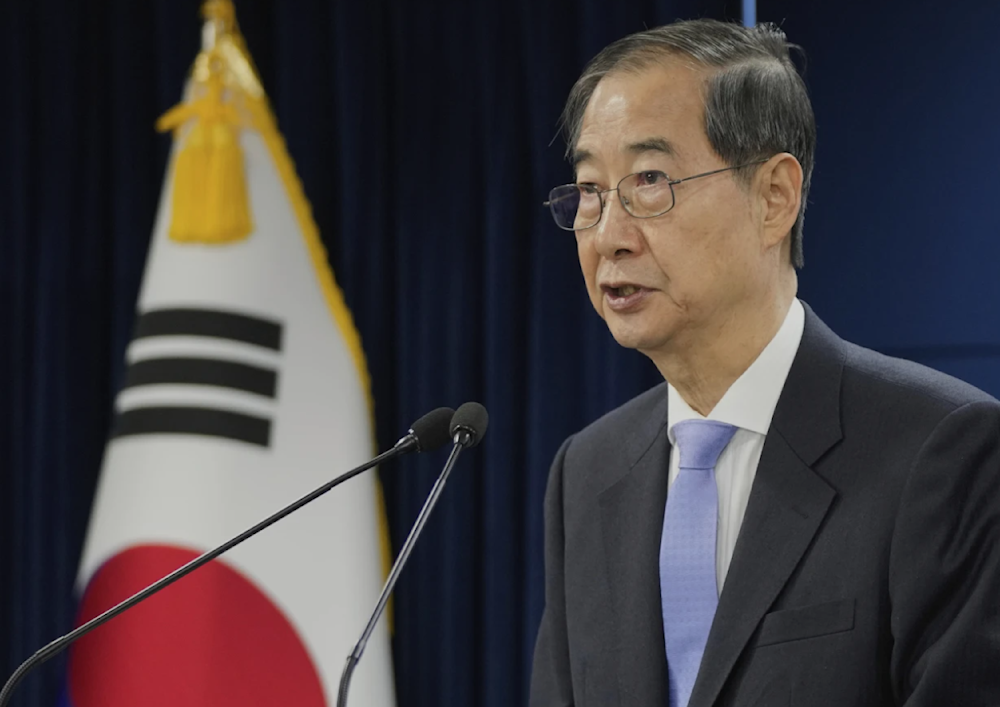South Korea 'will not fight back' against Trump tariffs: Acting PM
Han Duck-soo believes the United States had a massive role in making South Korea what it is today.
-
 South Korean acting President Han Duck-soo speaks during a briefing at the Government Complex in Seoul, South Korea on March 24, 2025. (AP)
South Korean acting President Han Duck-soo speaks during a briefing at the Government Complex in Seoul, South Korea on March 24, 2025. (AP)
South Korea "will not fight back" against US tariffs, its acting president has announced, citing the country's historical debt to Washington ahead of trade discussions with President Donald Trump's administration, which are expected to begin next week.
Following Yoon Suk Yeol's removal from office this month by the country's constitutional court, Han Duck-soo, a technocrat serving as acting president, highlighted that "the role of the US was huge in making Korea what it is now."
In an interview with the Financial Times, Han stated that the US provided aid, technology transfer, investments, and security assurances during the Korean War, making South Korea a welcoming investment climate for foreigners.
According to the acting PM, Seoul's "industrial prowess" and financial development are due to assistance from the US.
He cited that due to this debt, the country will negotiate with Trump to find "solutions which are more win-win for both, rather than taking their actions as the objective against which we should fight back."
South Korean officials were shocked when Trump slapped a 25% reciprocal tax on the nation this month, despite a free trade deal requiring South Korea not to levy duties on American goods.
Hyundai and Kia, Korean automobile heavyweights, were also stung by a separate 25% US automotive charge, while the country's chipmakers and pharmaceutical businesses face prospective levies under a national security investigation unveiled by Washington this week.
South Korea's largest businesses are investing tens of billions of dollars in innovative manufacturing sites for semiconductors, electric car batteries, and solar panels.
However, Seoul's trade surplus with the US has increased dramatically, hitting a record $55 billion in 2024, as the US surpassed China as its top export destination.
Han, who claimed to have had a "good" 28-minute phone discussion with Trump earlier this month, said South Korea was open to negotiating cutting its trade surplus, including the purchase of US liquefied natural gas and commercial airliners. He went on to say that increasing cooperation in naval shipbuilding "may help the US in strengthening their alliances."
Liberation of trade to help Korean people: Han
He also stated that Seoul was open to examining South Korea's nontariff trade obstacles. Long-standing US objections include Seoul's vehicle emissions laws, opaque pharmaceutical pricing, reluctance to import certain American beef, and network fees levied on US video providers like as Netflix.
Han acknowledged that some industries "may suffer some problems" as a result of the discussions, but stated that a larger liberalization of trade between the two nations would "increase the welfare of the Korean people."
The Trump administration also launched trade discussions with Japan this week, prioritizing close allies in a bid to clinch some accords and begin to reverse the president's sweeping trade war, which has roiled global markets.
Trump, who threatened to withdraw US troops from the Korean peninsula during his first term, stated this month that negotiations with Seoul would explicitly link trade and security issues, including "payment for the big time military protection we provide to South Korea" — a potential major source of concern for Seoul, which relies on US protection from the DPRK's nuclear threats.
Han emphasized that there was no "clear framework" for addressing security, but he expressed openness to reconsider a cost-sharing agreement reached with the Biden administration last year about the 28,500 US soldiers stationed in South Korea, "depending on the issues."

 4 Min Read
4 Min Read










